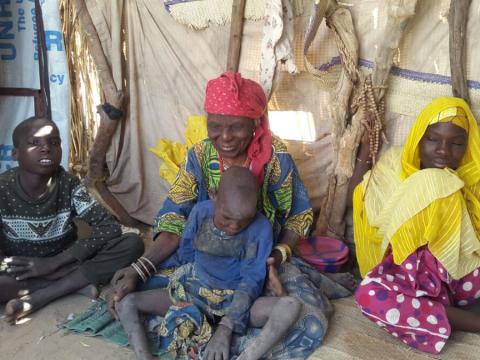If you are blind, you are not seen

Village attacks like the one that happened in Damasak, northern Nigeria, are deadly and often unannounced. For people with mobility challenges and hearing, learning or even seeing disabilities it is often a death trap. Thankfully for Aishatu, 60, she was remembered, and she now lives in a refugee camp in Niger. Unfortunately, many like her in big emergencies such as the lake Chad Basin crisis, are often hidden, unseen, unheard, ignored and forgotten. She narrates her experience to World Vision’s Communications Specialist, Geoffrey Kalebbo Denye.
Aishatu is 60-years old. She spends most of her day seated with her grandson who like her suffers from some form of disability. She is blind, and he is living with debilitating mental condition. She is expressively excited to receive guests, while her grandson seems a bit apprehensive. Grandma stretches her hand gently and holds him. She then moves her palm over his body and she feels his nakedness. Without attracting so much attention she finds a piece of cloth and covers him up smartly.
My colleague, Shirley Lo, from World Vision is interested in understanding mechanisms of humanitarian accountability in this sprawling camp of over 7,500 mostly Nigerian refugees. They fled their homes because of the conflict in the Lake Chad Basin. Shirley asks Aishatu how she receives information about happenings in the refugee camp to which, the old woman responds plainly “I am an old woman and I do not get information from anyone. I am blind.”
She so responds unaware that we nearly missed visiting her home after the social worker who accompanied us had told us there was no one to speak to in the home. It is only after we insist we’ve heard someone speak that he explains “it is just an old, blind woman”.
He is overly surprised when we say that she is who we would like to speak to. Aishatu shares how she gets to know about food distribution saying: “my children tell me when food has been brought and when distribution is to happen. I have 10 children, my confidant being the eldest son. I tell him my concerns,” she explains.
She knows that when food is distributed she gets rice, beans and salt, but adds “I do not get onions, tomatoes. My son buys those for me. I love Kola nuts, unfortunately my son left for Sayam Forage early today before I could tell him to bring me some”
Wondering how she delivers messages to humanitarian service providers? “I have never done this. But now that you have made me aware that I can do so I will start sending my son with specific messages to deliver to the organisations that help us. I am always seated in this same place, and never knew that I could send a message to others. Thanks for telling me about this”
She is one of 9.2 million people in urgent need of humanitarian assistance as a result of an unrelenting conflict in northern Nigeria, that has also affected people in border villages of neighbouring countries Cameroon, Chad and Niger.
“When our village, Damasak, was attacked we fled and came here.” How did you do it? She smiles before answering “by my legs. Someone helped take my hand and hurriedly took me to the river, where I was helped to cross by boat.”